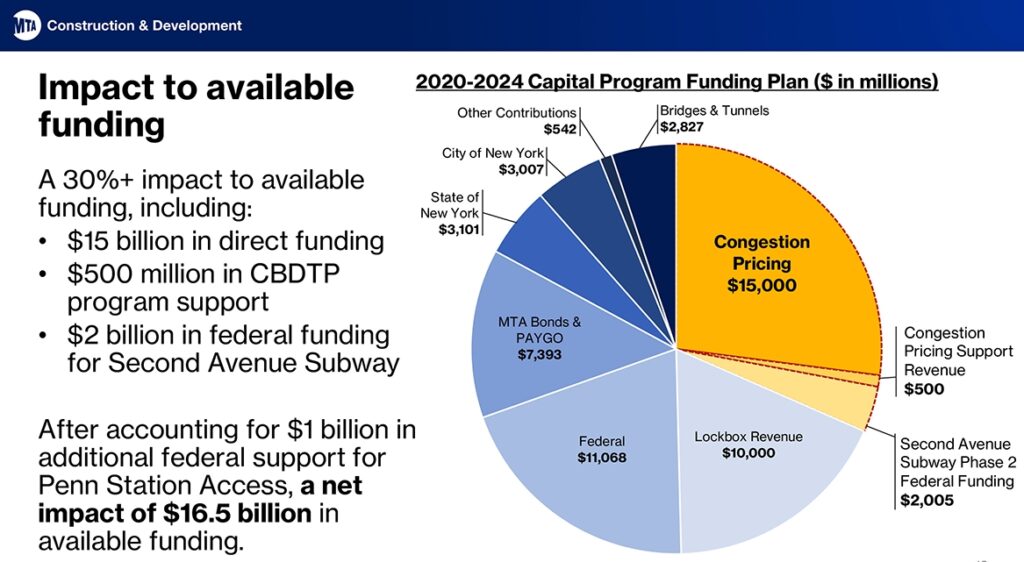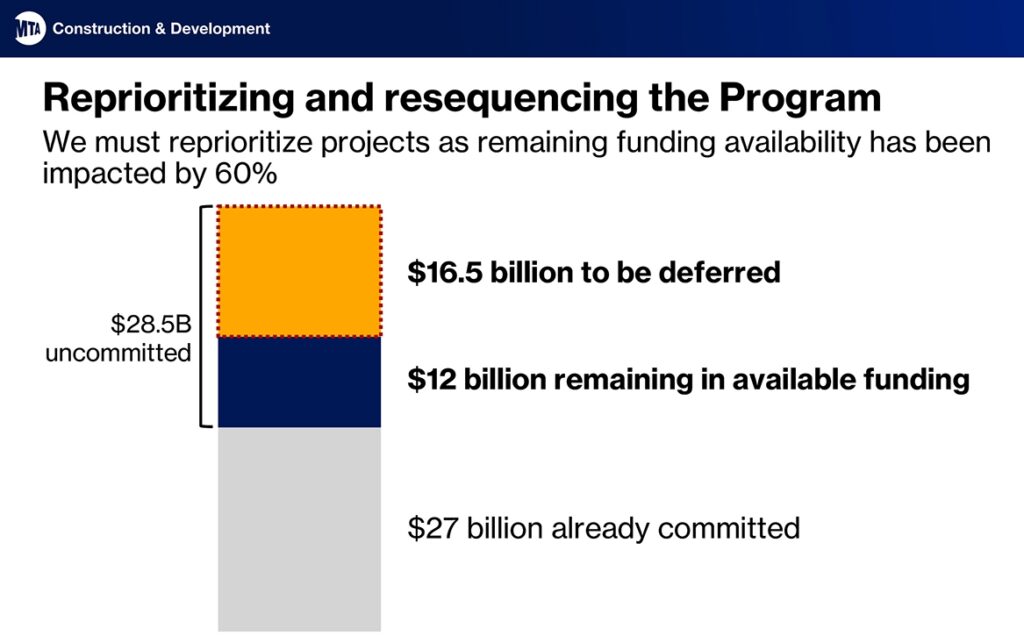MTA to Defer $16.5 Billion In Capital Projects, Repairs
By JOHN JORDAN – July 2024
NEW YORK—The fallout from the decision by New York Gov. Kathy Hochul last month to put the New York City congestion pricing tolling program on pause became painfully clear at the Metropolitan Transportation Authority’s Board meeting on June 26 with the price tag being $16.5 billion in deferred capital projects.
While Gov. Hochul vowed to provide funding to adequately finance MTA projects, at press time no firm plans was released. Therefore, unless the congestion pricing program, a hybrid or some other funding mechanisms are put in place, the region’s construction trades will see significant adverse impacts.

The congestion pricing program, which was scheduled to go into effect on June 30, was to infuse the MTA with approximately $15 billion for capital projects going forward. The governor’s 11th hour decision forced the MTA to scramble to address the funding shortfall and ensure adequate monies were allocated to state of good repair work on the system.
According to a presentation by executives of the MTA’s Capital Division, the pause in congestion pricing will result in a 30% impact on funding; $15 billion in direct funding, $500 million in Central Business District Tolling Program support and $2 billion in federal funding for the Second Avenue Subway project. After accounting for $1 billion in federal support for the Penn Access Project, the MTA will suffer a $16.5-billion shortfall in available funding.
Projects to be Deferred And Economic Impacts
Future Second Avenue Subway Phase 2 Projects – Impact: $5 Billion – $3 billion in local funding now needed for state-of-good repair work. This makes $2 billion of federal funding unavailable.
Accessibility Projects – Impact: $2 Billion – A total of 23 station projects are being deferred. Potential cancellation of the Long Island Rail Road Hollis and Forest Hills projects.
Zero Emission Buses – Impact: $500 Million – More than 250 electric bus purchases. Deferral of bus depot charging infrastructure
Upgrades to Infrastructure & Technology – Impact: $1.5 Billion – Verrazano-Narrows Bridge ramp reconstruction and dehumidification. Public address upgrades At more than 70 stations
Rolling Stock – Impact: $1.5 Billion – Future generation of subway cars. New CNG buses. Passenger and work locomotives for railroads
Signal Modernization – Impact: $3 Billion – Fulton Line. Sixth Avenue Line and 63rd Street Tunnel
State of Good Repair – Impact: $3 Billion Funding Gap
Less Urgent Work to be Deferred: Five subway station renewals. Station component repairs. Various structural repairs
After the session, the MTA Board approved a resolution by a 10-1 vote expressing its support for the congestion pricing program. The resolution states:
RESOLVED that the Board recognizes that the CBDTP will not be implemented in June 2024, due to the pause in the program; and be it further,
RESOLVED, that the date of implementation of the CBDTP is hereby extended from in or about June 2024 until after such time as the execution of the legally-required tolling agreement among the Project Sponsors – New York State Department of Transportation, New York City Department of Transportation, and Triborough Bridge and Tunnel Authority – and also by the Federal Highway Administration; and be it further, RESOLVED, that the President of the Authority or her designee is hereby fully authorized and directed to take such steps as may be necessary or desirable to implement the CBDTP until after such time as the required final agreement has been executed.

Shortly after the MTA Board session, Gov. Hochul issued a lengthy statement vowing to support the capital plan.
“In the coming months, my team will work with the MTA to further develop a comprehensive approach to fund both the remaining projects in the 2020-2024 capital plan and the new capital plan. And I will continue to work in partnership with the State Legislature to implement comprehensive solutions and ensure appropriate funding sources in next year’s budget.”
She later added, “This administration’s proven commitment to the MTA, as well as my record of delivering resources for critical priorities in the State budget, should provide the MTA with full confidence in future funding streams. While the timing of the next budget may necessitate temporary adjustments to the timeline of certain contracts, there is no reason for New Yorkers to be concerned that any planned projects will not be delivered.
While many political officials, particularly those located outside of the Congestion Pricing District, came to the governor’s defense over the decision to pause the program, a host of construction industry executives are urging the governor to reinstate congestion pricing.
Carlo Scissura, president and CEO of the New York Building Congress, told Construction Dive, “We have said from the moment Gov. Hochul postponed congestion pricing that the future of New York City as we know it is in danger. There is no silver bullet here.”
Mr. Scissura expects construction firms, both large and small, to feel the immediate impact of these pauses, with a significant reduction in jobs and economic activity.
Study Finds 100,000 Jobs Are at Risk
Rachael Fauss, Senior Policy Advisor for Reinvent Albany, a transportation advocacy group, testified before the MTA Board on June 26 that the organization issued a report that noted the MTA paid $35 billion to tri-state area vendors from 2014 to 2023.
“Unfortunately, our analysis also found that Gov. Hochul’s ‘indefinite pause’ of the MTA’s congestion pricing program puts more than 100,000 jobs in New York State at risk,” she said, “While most MTA capital plan work is done by private contractors, our prior analyses found that about $3 billion, or 21% of the $15 billion raised by congestion pricing, would support in-house capital work conducted by MTA workers, and Gov. Hochul has also put their union jobs at risk.”
